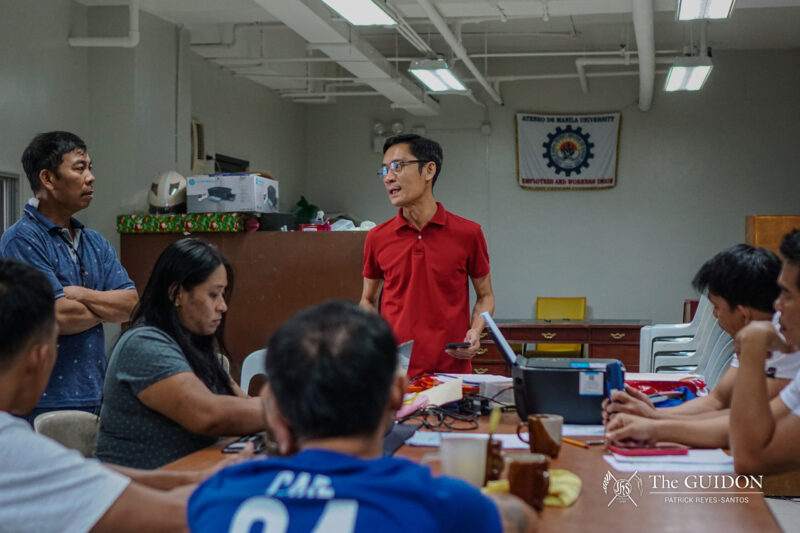THE ATENEO Human Rights Center (AHRC) filed a petition for certiorari on October 2 in the Supreme Court (SC) questioning the legality of the recently enacted Republic Act 10175, also known as Cybercrime Prevention Act of 2012.
The petition further requested a temporary restraining order (TRO) to stop the implementation of the said law, which became effective last October 3.
The law, which is a consolidation of Senate Bill 2796 and House Bill 5808, defines cybercrime, “providing for the prevention, investigation, suppression and the imposition of penalties therefor and for other purposes,” according to the act. The act was approved last September 12.
Based on the AHRC’s press release on its Facebook page, the petitioners are Ateneo Law Professor Melencio Sta. Maria, Ateneo Law School Dean Sedfrey M. Candelaria, AHRC Executive Director Ray Paolo J. Santiago, and other AHRC lawyers Amparita Sta. Maria, Gilbert V. Sembrano and Ryan Jeremiah D. Quan.
They are assisted by lawyers Maria Patricia R. Cervantes and Nina Patricia D. Sison-Arroyo, who are also law faculty and members of the AHRC.
The AHRC press release read, “RA 10175 is unconstitutionally overbroad, especially on the libel aspect. It violates right to due process, the freedom of expression and the prohibition against unreasonable searches and seizures.”
The petition stressed that “there is urgent need, as well as wisdom, to understanding how the Internet is expanding and evolving our very concepts of free expression.”
Sta. Maria wrote in his column at Interaksyon.com, “It [the cybercrime law] may not only take down your computer system. It can also take you down as a person.”
According to the press release, “The Ateneo human rights advocates also sought an order to be issued for the setting of oral arguments, considering that the case is ‘of transcendental importance, a first of its kind in our history.’”
One act, multiple voices
Sanggunian President Gio Alejo believes that “the essence of having a Cybercrime Prevention Law in itself is good and necessary especially during these times. The current version though is totally unacceptable and a breach of our freedom of expression.”
He added, “I hope the SC reviews the questionable provisions and acts on them well. Also, this is a clear indication of the baluktot na daan that is present even in a chamber as high as the Congress and Senate.”
Meanwhile, Sanggunian Vice President Ian Agatep said, “Such legislation becomes problematic on some human rights issues with regard to freedom of speech and especially with the youth who are greatly involved in participating online.”
Richard de Guzman of the Filipino Department said, “Kung ‘yung simpleng kakayahan mo na magsabi ng iyong sama ng loob sa mga taong namumuno sayo ay hindi na puwedeng gawin dahil nga bawal na iyon sa ilalim ng batas… mali iyon kasi lumalabag iyon sa prinsipyong demokrasyang pinaglalaban natin (If that simple capability to voice your grievance to the people in power cannot be done because it is already forbidden under the law… it’s wrong, for it violates the principle of democracy that we’re fighting for).”
Ateneo Management Association President Via Puyat said, “After hearing some senators say that they didn’t notice the libel clause and that they didn’t know about it when they passed the law, it comes as no surprise that Filipinos are outraged by the carelessness of the Senate.”
She added, “It is their responsibility to carefully screen the laws they create and pass. The senators shouldn’t waste their time trying to figure out whose responsibility it was to examine that provision of the Act. Instead, they should begin to take measures to amend it.”
Ateneo alumnus Miggy Zaballero (AB SoS ’10) expressed conditional opposition to the law. “I am for some of the provisions stated in the law such as the provisions on cybersex, identity theft and child pornography, but [I] am against other aspects particularly the libel clause, which for me not only lacks clarity but also borders on violating our right to free speech, especially online.”
Political science sophomore Leo Francis Abot argued that “[the act] should have been deliberated upon more instead of [it] quickly becoming a law.”
Like Zaballero, Abot favored some parts of the law, but was against the provision on libel.
“The right to free speech should be held inviolable, especially in the internet where today it has become the virtual public space. It is absolutely disgusting as well if, as public opinion feels, the libel provision is simply to take vengeance on critics or to silence criticism, which I believe is important in democratic discourse.”
He added, “I also find it irresponsible for the senators who voted for its passing yet overlooked the implications of the libel provision. I hope the law is amended to keep good provisions and eliminate potentially unconstitutional ones that infringe on our rights.”
As of press time, the SC has not issued any TRO against the implementation of the Cybercrime Prevention Act.






